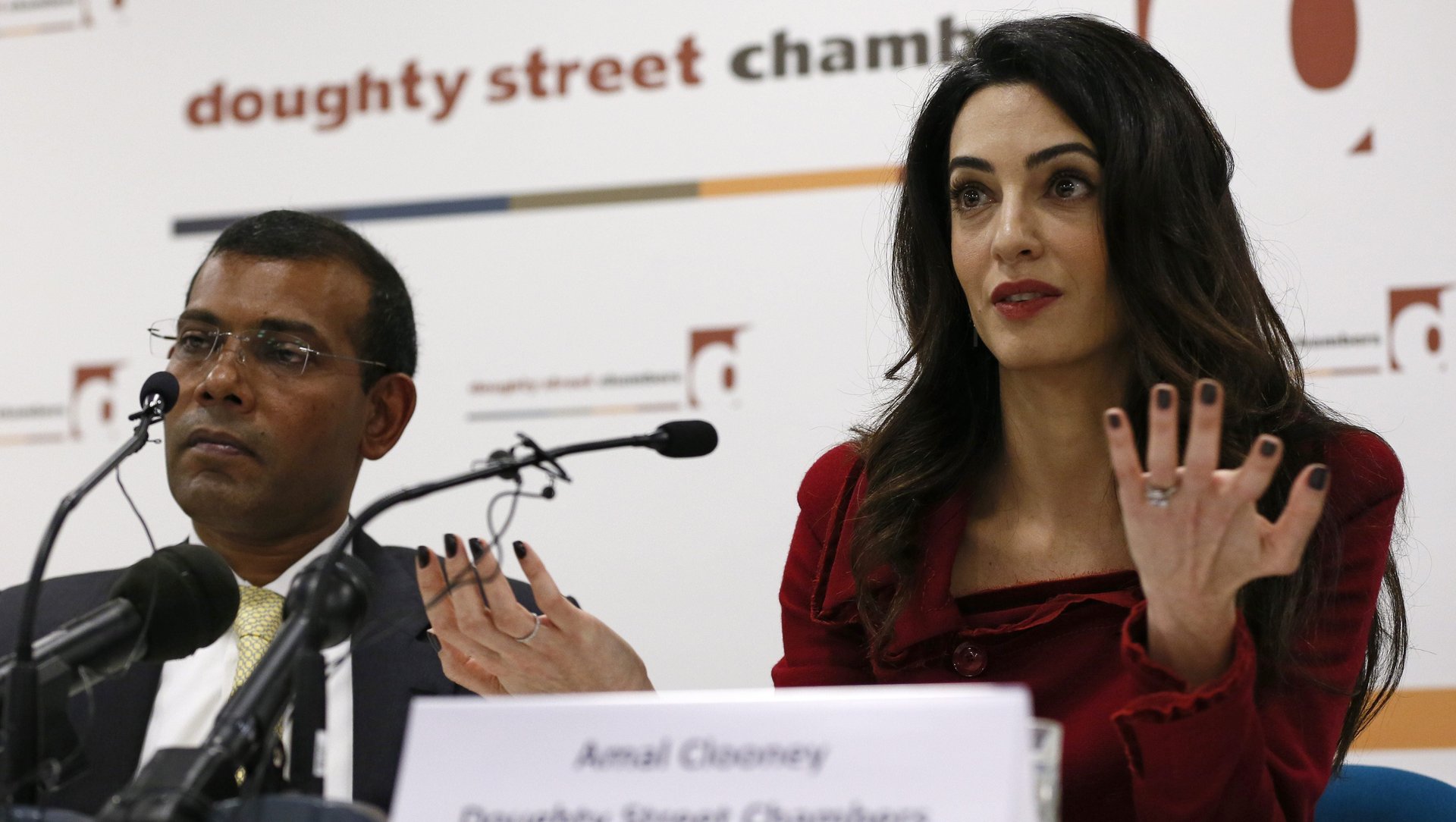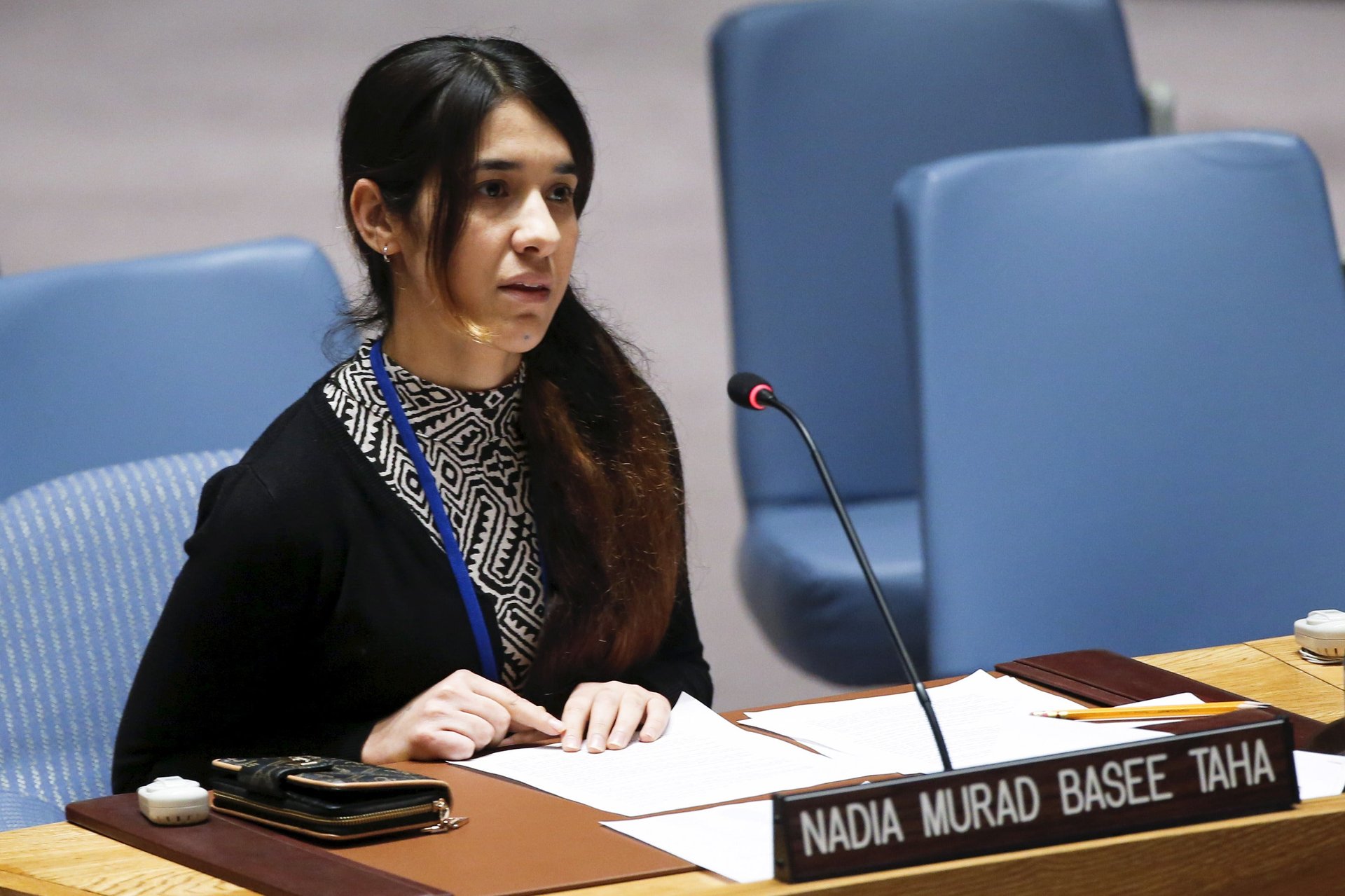Amal Clooney’s case against ISIL shows how impossible it is to prosecute for war crimes against women
Earlier this year, human rights lawyer Amal Clooney announced an audacious plan—putting Islamic State leaders on trial for their crimes against women and girls. Clooney is representing the Yazidi women, a religious minority from northern Iraq, whom ISIL deems “infidels” and “spoils of war.” Her clients include women like Nadia Murad, a 23-year-old Nobel Peace Prize nominee who was sold as a sex slave to an ISIL commander in 2014 and regularly gang-raped until she lost consciousness.


Earlier this year, human rights lawyer Amal Clooney announced an audacious plan—putting Islamic State leaders on trial for their crimes against women and girls. Clooney is representing the Yazidi women, a religious minority from northern Iraq, whom ISIL deems “infidels” and “spoils of war.” Her clients include women like Nadia Murad, a 23-year-old Nobel Peace Prize nominee who was sold as a sex slave to an ISIL commander in 2014 and regularly gang-raped until she lost consciousness.
“How can it be that the most serious crimes known to humanity are being carried out before our eyes, but are not being prosecuted by the International Criminal Court in The Hague?” Clooney asked at the Women in the World summit last month. Addressing the United Nations, she emphasized that “Nadia and others like her are not seeking revenge, they are seeking justice—the opportunity to face their abusers.”
While Murad is one of a fortunate few Yazidis who managed to escape their captors—she was eventually smuggled to Stuttgart, Germany—her experience at the mercy of ISIL isn’t unique. The jihadist group’s horrific treatment of women has been widely reported, and nearly 2,000 women have been held captive since ISIL invaded the Yazidi district in 2014. ISIL reportedly trades these women at “slave bazaars,” where their monetary worth is determined by age and attractiveness. According to the Iraqi News, girls aged 1-9 are the most expensive, selling for roughly $170 each.
Clooney’s suit is a crucial attempt to make the international community confront these crimes, and to end impunity for sexual violence. Bombing ISIL into oblivion isn’t enough, she has said, because “you can’t kill an idea that way.” By bringing the atrocities against women into plain view, and setting a precedent that perpetrators will be pursued, Clooney is pushing to establish rape as an actionable offense even in times of war, not acceptable collateral damage.

“Their lives were destroyed, and their lives will remain destroyed if we don’t say anything,” Murad said in an interview. “Despite everything [ISIL] did, they couldn’t take the knowledge I had that I was right, and they were wrong… All of the women and girls who are in their hands have justice on their side. And because I have rights, I will go after my rights.”
Clooney is currently trying to gather evidence and testimonies from survivors, but actually bringing ISIL leaders to court may prove almost impossible. First, there’s the difficulty of apprehending them—no easy undertaking, especially while a war is raging. Then there’s the challenge of proving sexual violence. As William Schabas, a professor of international law at Middlesex University, explains, this can be exceptionally difficult in the midst of conflict. It requires gaining access to the place the crimes were perpetrated, identifying witnesses, and convincing them to testify at a trial that probably wouldn’t take place for years. Even in less messy circumstances, actually proving rape in court is a long and expensive process.
Investigating and proving sexual violence is much more challenging than with other militant crimes, such as the destruction of religious and historical sites. Last month, Malian jihadi Ahmad Al-Mahdi, a member of Islamic extremist militia Ansar Dine, was convicted by the ICC of destruction of cultural heritage for his involvement in demolishing at least 10 monuments in Timbuktu, including one World Heritage Site. As head of the Islamic Police, Al-Mahdi was one of the most powerful men in the city, and reportedly oversaw the rape, torture, and enslavement of many women. There are more than 100 allegations of sexual violence against him, and 33 victims have filed statements with the ICC. Still, it’s unlikely these latter crimes will be prosecuted.
“Since its first proceedings, the ICC has chosen to prosecute based on charges it can defend and prove,” says Florent Geel, Africa director for the International Federation for Human Rights. That often means avoiding time-consuming and expensive investigations with less-than-certain prosecutions—like sex crimes. The only glimmer of hope is in the sheer scale of ISIL’s offenses, which Schabas says could make it “possible to demonstrate that this was either a policy deliberately pursued by an armed group or a pattern of acts that was known to and tolerated by those in command.”
Even then, there’s still the problem of jurisdiction. Leila Sadat, an ICC prosecutor and special advisor on crimes against humanity, points out that neither Iraq nor Syria has ratified the Rome Statute, which means the ICC can’t prosecute crimes committed in either country. “For the time being, there is not much we can do except collect evidence in the hope that there may be some opportunity to bring an action in the future,” she says.
Put together, this series of hurdles means it’s more than unlikely that ISIL leaders will ever be convicted of their crimes against women and girls. But even if Clooney’s suit proves largely rhetorical, it still has merit. It’s a statement about the exigency of treating conflict-zone rape as the war crime that it is—and the failure of the world’s highest courts and leaders to do so.